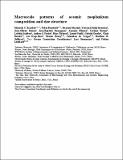Por favor, use este identificador para citar o enlazar a este item:
http://hdl.handle.net/10261/249861COMPARTIR / EXPORTAR:
 SHARE SHARE
 CORE
BASE CORE
BASE
|
|
| Visualizar otros formatos: MARC | Dublin Core | RDF | ORE | MODS | METS | DIDL | DATACITE | |

| Título: | Macroscale patterns of oceanic zooplankton composition and size structure |
Autor: | Brandão, Manoela C.; Benedetti, Fabio; Martini, Séverine; Soviadan, Yawouvi Dodji; Irisson, Jean-Olivier; Romagnan, Jean-Baptiste; Elineau, Amanda; Desnos, Corinne; Jalabert, Laëtitia; Freire, Andrea S.; Picheral, Marc; Guidi, Lionel; Gorsky, Gabriel; Bowler, Chris; Karp-Boss, Lee; Henry, Nicolas; Vargas, Colomban de; Sullivan, Matthew B.; Tara Oceans Coordinators; Acinas, Silvia G. CSIC ORCID ; Stemmann, Lars; Lombard, Fabien | Fecha de publicación: | ago-2021 | Editor: | Nature Publishing Group | Citación: | Scientific Reports 11: 15714 (2021) | Resumen: | Ocean plankton comprise organisms from viruses to fish larvae that are fundamental to ecosystem functioning and the provision of marine services such as fisheries and CO2 sequestration. The latter services are partly governed by variations in plankton community composition and the expression of traits such as body size at community-level. While community assembly has been thoroughly studied for the smaller end of the plankton size spectrum, the larger end comprises ectotherms that are often studied at the species, or group-level, rather than as communities. The body size of marine ectotherms decreases with temperature, but controls on community-level traits remain elusive, hindering the predictability of marine services provision. Here, we leverage Tara Oceans datasets to determine how zooplankton community composition and size structure varies with latitude, temperature and productivity-related covariates in the global surface ocean. Zooplankton abundance and median size decreased towards warmer and less productive environments, as a result of changes in copepod composition. However, some clades displayed the opposite relationships, which may be ascribed to alternative feeding strategies. Given that climate models predict increasingly warmed and stratified oceans, our findings suggest that zooplankton communities will shift towards smaller organisms which might weaken their contribution to the biological carbon pump | Descripción: | This article is contribution number 121 of Tara Oceans.-- 19 pages, 6 figures, 2 tables, supplementary information https://doi.org/10.1038/s41598-021-94615-5.-- Data availability: Median ESD and abundance values by zooplankton groups are available at https://doi.org/10.17632/nwvjwccgvh.1. Zooplankton imaging datasets from the Tara Oceans expeditions are available through the collaborative web Ecotaxa application and repository under the addresses: https://ecotaxa.obs-vlfr.fr/prj/377, https://ecotaxa.obs-vlfr.fr/prj/2245, https://ecotaxa.obs-vlfr.fr/prj/378 for the WP2 net; https://ecotaxa.obs-vlfr.fr/prj/397, https://ecotaxa.obs-vlfr.fr/prj/398, https://ecotaxa.obs-vlfr.fr/prj/395 for the Bongo net; https://ecotaxa.obs-vlfr.fr/prj/415, https://ecotaxa.obs-vlfr.fr/prj/409, https://ecotaxa.obs-vlfr.fr/prj/408, https://ecotaxa.obs-vlfr.fr/prj/411, https://ecotaxa.obs-vlfr.fr/prj/412 for the Régent net. Contextual data from the Tara Oceans expedition, including those that are newly released from the Arctic Ocean, are available at https://doi.org/10.1594/PANGAEA.875582 | Versión del editor: | https://doi.org/10.1038/s41598-021-94615-5 | URI: | http://hdl.handle.net/10261/249861 | DOI: | 10.1038/s41598-021-94615-5 | E-ISSN: | 2045-2322 |
| Aparece en las colecciones: | (ICM) Artículos |
Ficheros en este ítem:
| Fichero | Descripción | Tamaño | Formato | |
|---|---|---|---|---|
| Brandao_et_al_2021.pdf | 3,68 MB | Adobe PDF |  Visualizar/Abrir | |
| Brandao_et_al_2021_suppl_1.xlsx | 21,43 kB | Microsoft Excel XML | Visualizar/Abrir | |
| Brandao_et_al_2021_suppl_2.xlsx | 9,63 kB | Microsoft Excel XML | Visualizar/Abrir | |
| Brandao_et_al_2021_suppl_3.xlsx | 70,48 kB | Microsoft Excel XML | Visualizar/Abrir | |
| Brandao_et_al_2021_suppl_4.pdf | 13,5 MB | Adobe PDF |  Visualizar/Abrir | |
| Brandao_et_al_2021_suppl_5.docx | 21,92 kB | Microsoft Word XML | Visualizar/Abrir |
CORE Recommender
PubMed Central
Citations
6
checked on 10-abr-2024
SCOPUSTM
Citations
28
checked on 23-abr-2024
WEB OF SCIENCETM
Citations
27
checked on 24-feb-2024
Page view(s)
85
checked on 01-may-2024
Download(s)
130
checked on 01-may-2024

